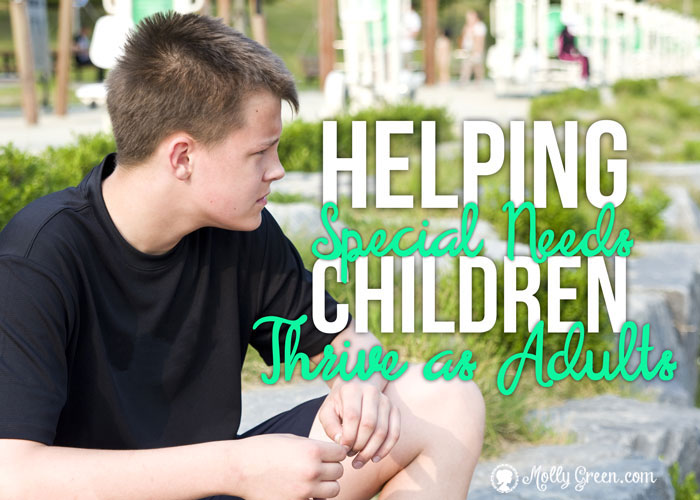By Eric Osborn
Our surname comes with a family motto, “Pax in Bello.” Translated it essentially means, “Peace in the Midst of Strife.” It is our desire to not only be at peace in the midst of the various trials life has for us, but to thrive in the midst of them. Four of our five children were adopted and came with unique special needs. After finally figuring out how to help our children thrive in childhood, we found ourselves facing another mountain that had to be climbed: learning how to prepare special needs children for adulthood. Now that two of our sons are in their late teens and are technically adults, they are finding it very difficult to launch into the next phase of life.
Our eldest is “twenty going on fourteen” (“dysmaturity” is common in children with FASD) and struggles with depression, profound anxiety issues, and a lack of interest in anything other than socializing with friends. I have taken time off of work many times to help him turn in applications, sign up for temp agencies, and explore programs like Job Corps (a federal program for at-risk youth that provides training and job placement assistance). Nothing.
Our second oldest is eager to work and loves to have resources to do simple things for himself and do simple things to bless others. He is mildly autistic and struggles with reading and communication in general (though most people don’t see it at first). He is strong and self-disciplined. He too has been trying to find part-time work for almost two years. We suspect he is running into some prejudice about his issues. We are looking into some assistance from our state’s Department of Rehabilitation to help overcome his handicaps and find meaningful employment.
But our sons are not the only young men we know who are having problems finding and keeping work. Most of the late teens to twenty somethings we know still live at home and are largely unemployed. These are not all foster or adoptive children. But like us, their parents are at their wits end trying to figure out what to do. Being a problem solver by temperament, I thought long and hard about this issue.
Challenges Facing Special Needs Children Today
We live in a different country and a vastly different economy than what our parents and grandparents grew up in. As a result, many young people (ages 18-25) seem to be falling into a chasm of indecision, apathy, poverty, and—worst of all—dependence on others (parents, financial aid, and subsistence-level government assistance). In addition to this, our society has created a set of expectations and a love of ease that young people have become used to and that requires a lot of money to maintain. On top of this, dysfunction and dysmaturity that many foster and adoptive children deal makes the problem even harder.
The result is that many special needs young people cannot or will not leave home at 18 or even through their mid-20s. If they are forced to do so by any circumstances (even their own doing), they quickly end up impoverished, seemingly unable to work, unable to get around to find work or resources, and without a permanent place to stay. Not a pretty picture. The information below would be good to share with your special needs teen, but can be used for any young person approaching adulthood.
How to Prepare Special Needs Children for Adulthood
Some hard truths all young people today must come to embrace as they approach adulthood.
The end goal for childhood is that you become an independent, self-supporting, responsible adult citizen.
There is great virtue in being self-reliant. “He who works skillfully with his hands can stand proud before kings,” as the proverb says. Believing the opposite (that dependence upon the charity and provision of others is a virtue) shows a profound lack of wisdom and leads to enslavement to those you are dependent upon (friends, family, or the government).
No one owes you anything.
You will have to work for your pay. It will be your job to convince someone to hire you and to work hard to keep your job. Be prepared to dress well, and conform as much as it takes … whatever it takes to get the job. No job = no successful transition into adult life!
Everything in adult life requires money.
A place to live, food to eat, transportation, a social life, and entertainment all cost a lot (and more every year). You may not get to live it up when you first move out, but if you manage your resources carefully you will get to do something.
Expect to start out fairly Spartan in your first apartment or dwelling.
You won’t get to have all the creature comforts it took your parents 20+ years to amass. You may have little, but it is all yours. Take pride in being independent.
You need to start prepping for your future before it “happens” to you.
Have a realistic plan set up before you turn 18. Have a plan B and a plan C, just in case, that is realistic and that you can live with. Changing your plan isn’t a problem … turning 18 or older without one is a problem. Special needs teens will likely need extra guidance here.
How to Get Started Preparing Your Children for Adulthood
Adjust your expectations to the new realities (see above).
Find any legal job that pays.
- If you are under 18, at least a part-time job of some kind … any kind!
- If you are over 18, any legal full-time job, or two to three part-time jobs.
- This is not the time to be so proud, picky, or prissy that you can’t find work. Land any job you can—it’s an important start. Without a way to earn resources (money, etc.), you will never be able to become self-reliant and move out on your own.
Do some career exploration now; look for opportunities and take them!
Do some reliable research (ask questions, search newspapers, Internet, etc.) about how much it costs to move out and live on your own.
Don’t get overwhelmed—which is something that can easily happen. Start with the tasks in their numerical order and keep working on it until you have it done, then move on to the next one. It is okay to ask for help. You will need guidance and lots of information. In the end, no one can make you grow up or become an adult for you. It is something each person has to do for themselves.
Looking like an adult doesn’t make you one—acting and living like an adult does.
How Can Parents, Churches, and Communities Help?
- Teach special needs children and young people the right way of looking at life and adulthood (see the Hard Truths above). Impress upon them the true goal of childhood so that they automatically start working towards it too. By all means, do so in an age appropriate manner and remember, you will need to be creative and repetitive for a special needs child.
- As they grow up, don’t satisfy their every whim and buy them whatever they desire. Have them work in an age appropriate manner to earn greater privileges or resources. By the time a child is a teenager, they should understand that they are expected to find some kind of job (mowing lawns for neighbors, babysitting, delivering papers, raking leaves, cleaning out garages, sweeping up at a family owned business, raising 4H animals, whatever they can come up with). Teach them how to delay gratification and save these hard-earned resources for some of the fun things they crave (game systems, computers, cell phones, special clothing, eating out with friends, movies).
- Get to know people who employ other people and solicit their cooperation to allow your young person to job shadow them, or even volunteer to work for free, so they can observe the kind of work their job entails or someone who could eventually hire them.
- Many parents have a difficult time doing #3. Not everyone has a relative that is a business owner or has friends in high places. This is where churches and communities can be a huge help. I propose that churches identify members of their congregation who are either employers or are one of those uniquely connected people in the community. In addition, I think churches should deliberately create a ministry to assist this transition process because our youth groups just don’t do this.
Closing Thoughts
Never forget, God loves your transitional-aged, special needs child. Figuring out how to prepare your special needs children for adulthood will not look the same as it might for neurotypical youth, but rest assured, He will go before you and direct their steps into the future He has prepared for them. You can rely on Him.
All children with special needs require much more hands-on parenting, monitoring, and guidance. Launching transitional-aged, special needs children requires a lot of parenting, patience, understanding of their special needs, and lots of love. Don’t take their behavior or challenges personally. They are doing the best they can. Help them understand what they need to do. Help them discover what they think they would like to try, and help them get that first job, whether it pays or not.
Get them started living and acting like an adult, and eventually they will be.







